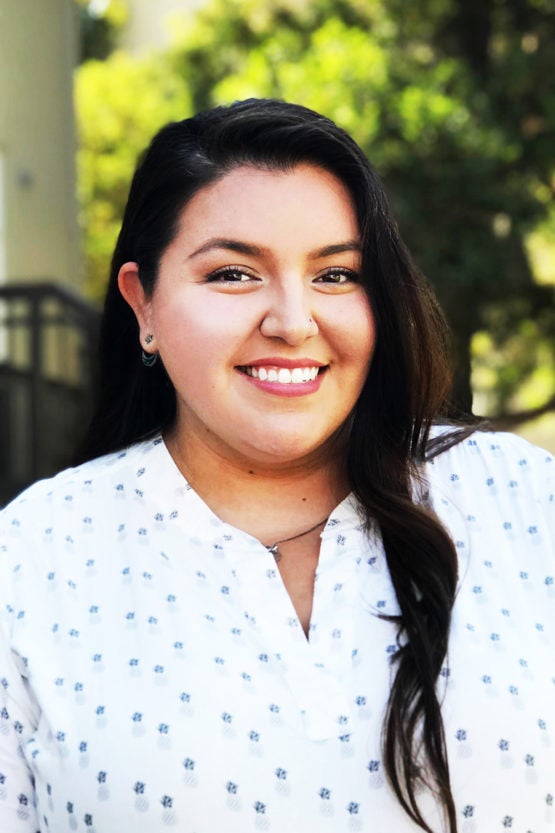Stanford adds three student support specialists
Stanford recently added to its student affairs staff three student support specialists, including two recent alums, whose work will focus on helping students manage stress, life transitions, interpersonal concerns and more.
Stanford students seeking additional support for maintaining a healthy and balanced life can now consult with three new student support specialists.
Maija Cruz, ’12, Brianna Griffin, ’11, and Sanne Lim have been hired to fill these positions. As student support specialists, they will assist students with managing stress and anxiety, help guide them through life transitions, advise them with their interpersonal concerns and more. To do this, they will provide coaching sessions, host new programs and events, and lead discussion groups and workshops.
Students interested in booking a session with them can do so on Well-Being at Stanford’s coaching page.

Maija Cruz (Image credit: Sean McKibbon)
Maija Cruz will serve the Stanford community centers and ethnic theme dorms. Her work will focus on holistic wellness, mental health, resiliency, cultural and positive psychology, intersectionality, supporting those who feel “othered” and encouraging indigenization of mindsets and processes.
Cruz has held numerous roles supporting Stanford undergraduate, graduate and professional students. She’s worked at the Stanford Graduate School of Business and Residential & Dining Enterprises’ Housing Operations. Most recently, she was supporting residential student staff and programs through Residential Education.
Cruz is a native of Milwaukee, Wisconsin, whose family is from the Bad River Band of Lake Superior Ojibwe in Northern Wisconsin. She is a member of the Stanford Class of 2012 and graduated with a bachelor’s degree in psychology with a focus on mind, culture and society. As a student, she found help from university staff who guided her through hard times. Now she wants to do the same for current students.
“I accepted the position because I want to help support the good work so many are already doing and contribute to a culture that better centers flourishing and well-being,” she said.

Brianna Griffin (Image credit: Colin Campbell)
Brianna Griffin will provide coaching to undergraduate students. Her specialties and interests include goal-oriented coaching; reclaiming one’s values; self-compassion; resilience; stress and anxiety; relationships; and navigating cultural differences.
Griffin grew up in Dallas, Texas. She graduated from Stanford in 2011 with a bachelor’s degree in science, technology and society. She initially pursued a career in medicine but pivoted toward opportunities where she could work with young people.
“What I bring to this role is an open heart and a ‘ride or die’ attitude,” Griffin said. “Life throws us curveballs, many of which we experience as students. I’m here to walk beside students as they meet the challenges of life at Stanford and empower them to flourish and grow into their best selves.”

Sanne Lim (Image credit: Colin Campbell)
Sanne Lim will work with the Graduate Life Office and Well-Being at Stanford to provide grad students with ongoing and developmental coaching. She will coach students in such areas as personal and professional development; handling stress, loss and grief, communication skills, cultural adjustments and relationships.
Lim is already familiar with Stanford and the student experience. For the past six years, she has provided mindfulness and behavior coaching to graduate students at Well-Being at Stanford (formerly, iThrive) and at the GSB 10X Wellness Program.
Lim was born in Singapore and grew up in Denmark. She holds a master’s degree in English from the University of Copenhagen, as well as professional certificates in Core Strengths Coaching from San Francisco State University and Integral Coaching from New Ventures West.
Lim believes the healthier and more grounded a person feels, the healthier and more peaceful their community and world will be. She said that when she works with students, she makes a point to be present and to create a safe space for them to talk about anything.
“My coaching offers an opportunity to explore what is happening in an experimental and experiential way,” she said. “Together, we look at new learning, skills and tools and how to implement those in the student’s daily life. We do so in ways that are doable and fit into the busy and complex lives most students live.”
